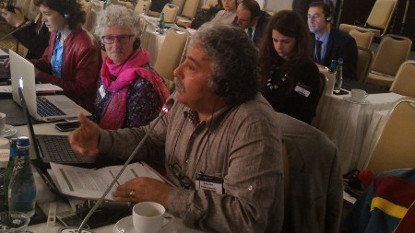(Antalya Turkey, May 5, 2016) Adnan Çobanoğlu from the Confederation of Farmers’ Unions (ÇİFTÇİ-SEN), a member organization of La Via Campesina, made a few important interventions at the 30th FAO Regional Conference for Europe and Central Asia, being held in Antalya, Turkey. Here is the full text of his interventions.
I am a farmer from Çiftçi-SEN, member of La Via Campesina and I am representing Smallholders on behalf of the CSO’s in Europe and Central Asia. With regards to the regional initiatives of the FAO we want to underline once again the core priorities identified by the CSO consultation to support the achievement of sustainable agricultural development, food security and realization of the SDGs:
Our first priority is the implementation of the regional initiatives related to development of the Agroecology. As you may know, FAO has organized Agroecology Symposia in Latin America, Africa and Asia. This year the FAO Agroecology Symposium will be organized also in Europe. Therefore, FAO should also support Agroecology at regional and national level.
We appreciate that FAO recognizes our agroecological knowledge and practices. These are essential in meeting diverse goals such as reducing rural poverty, eradicating hunger and malnutrition, achieving sustainable agriculture and development, fighting climate change, creating decent work for youth, reducing dependence on external agro-chemicals, increasing involvement of local communities and Indigenous Peoples, especially at community level for soils, water, biodiversity conservation and women’s knowledge of seed-saving and exchange.
The second priority of critical importance is the regional approach to develop concepts and practices to support smallholders’ local and territorial markets.
The bulk of the food consumed in the world and in the region is produced by us, the small-scale food producers and family farmers. Most of this food is channelled through the local and territorial markets, our markets. They are the most important for food security and nutrition.
Our markets are situated in and identified with specific territories. In this sense they are localized. They can range from village to national, or regional level; they can also be trans-boundary. They can include rural, peri-urban and urban areas. Building on our local and indigenous knowledge, they perform multiple functions within their given territories, starting with but not limited to the provision of diversified and nutritious diets, their contribution to the territorial economy and employment, to the defence of biodiversity and territorial ecosystems.
Local and territorial markets are central to the realisation of many SDGs. They are highly inclusive of and accessible to small scale food producers and other categories of food-insecure people and provide quality food to consumers. They can be especially advantageous to producers when they involve direct “farm to fork” or “deck to dish” sales such as Community Supported Agriculture, Community Supported Fisheries and farmers’ markets. Short supply chains that eliminate or reduce the role of middlemen benefit both producers and consumers.
We want these markets to be recognized and supported by appropriate public policies, and request support for increasing mapping of relevant data to make them more visible.
Public procurement at local level should also prioritise access for groups of small holders. Public policies should not create opposition between food standards/food safety regulations that should be context appropriate, and the access of small-scale food producers to local and territorial markets.
Adnan’ also intervened during the session titled, ‘Pulses for improving balanced nutrition and healthy food systems in Europe and Central Asia – International Year of Pulses 2016’
Below is the full text of his intervention:
We appreciate that the 68th United Nations General Assembly declared 2016 as the International Year of Pulses. We acknowledge the nutritional value and health benefits of pulses as well as their ecological benefits. Raising public awareness is important, but not sufficient. FAO should work to integrate the policies around pulses into State policies because:
- Pulses are important for human health and an essential source of food and protein for many, especially for poor people. Pulses not only create economic value but are a source of life for humans and animals.
- Pulses link nitrogen from the air to soil and plants. However, if chemicals, pesticides or other ecologically devastating production techniques are used in their production, the beneficial role of pulses becomes ecologically devastating.
- Pulses also provide solutions to climate change if they are produced through agroecological techniques.
- Given the detrimental effects on food safety and food sovereignty, we strongly oppose the use of GMO technology, as well as new breeding techniques, the technology of mutation breeding used in attempts to develop new varieties of plants and animals, including pulses. We support safer and socially more inclusive methods of traditional and participatory breeding based on local knowledge.
*******
56 representatives of small farmers, agricultural and food workers, fishing communities and fish workers, pastoralists, Indigenous Peoples, consumers, NGOs, women and youth, representing CSOs at the local, regional, national and international levels in the region of Europe and Central Asia, came together in Antalya, Turkey, on May 2-3, 2016 to provide our contributions to the 30th FAO Regional Conference for Europe and Central Asia (May 4-5-6, 2016, Antalya, Turkey).


